Credit to @vonhubert who solved my landing gear problems, please visit his site and upvote him as he builds some awesome Soviet aircraft!
Junkers EF.132 Flight Manual
Section I: Description
The Junkers EF.132 was a planned Luftwaffe project to build a high-speed jet bomber towards the end of WWII. Distinguished by its highly swept wings and tail surfaces, it was to carry up to 11,025 lbs of bombs and be powered by six 5,500 lb. thrust engines buried in the , giving it a top speed of 587 mph at 33,000’. It carried six 20mm cannon in three remotely-sighted defensive turrets, plus it may have also carried a forward firing armament of two additional cannon and featured an interesting landing gear arrangement. It never (thankfully) got off the ground, only reaching wind tunnel testing prior to the end of the war. Most of Junker’s efforts were carried off by the Soviet Union at the conclusion of the conflict and the design studies formed the basis for a number of Soviet experimental types and informed Soviet bombers such as the Myasishchev M-4 “Bison” and the Tupolev Tu-16 “Badger”. This is a 1 to 1 scale build with relatively accurate performance, weight and armament. It features bomb bay doors, rotating turrets and a bomb sight, sighted for drops from 30,000’ at 500 mph.
NOTE: This is a large, heavy jet which flies realistically, so it is a trim-intensive aircraft. Failure to take note of instructions pertaining to trim will lead to frustration!
Section II: Normal Procedures
Taxi & Takeoff:
1. Upon spawning, set brakes to stop bouncing and prevent rolling.
2. Activate AG1 for lights and nosewheel steering (as required).
3. Lower Flaps (AG1 + VTOL) (as required).
4. Set stab trim 1.5 units nose up [trim slider down 1 ½ notches].
5. Set full power (100%) for takeoff.
6. Maintain centerline w/small “stabs” of rudder, aircraft will rotate at 170 mph and liftoff at 210 mph.
7. Retract gear when clear of ground, trim forward to maintain pitch to climbout at 250 mph.
Climb:
1. Best rate of climb 250 – 300 mph, 10 – 15 degrees nose up.
2. Activate air-to-air mode to clear for air threats.
Level-Off and Cruise:
1. Set stab trim to .5 units nose up [trim slider down ½ notch], power as required for level flight.
Turret Control:
1. AG3 and VTOL to traverse the dorsal turret and activate guns, camera 2 for view.
2. AG4 and VTOL to traverse the tail turret, AG5 and VTOL for tail gun elevation and to activate tail guns, camera 3 for view.
3. AG6 and VTOL to traverse belly turret and activate guns, camera 4 for view.
Bombing:
NOTE: Bombsight is calibrated for 30,000’ above target and 500 mph airspeed. Recommend setting Initial Point (IP) for bomb run approximately 2 mins (8.3 miles) prior to release point.
1. Level off at 30,000’ and fly level at 500 mph (approximately 80% rpm). Aircraft will fly level at approx 2 – 2.5 degrees nose up with trim set approx .5 units nose up [trim ½ notch down].
2. Open bomb bay doors with AG2 and VTOL down.
CAUTION: Be sure to open bomb bay doors prior to releasing weapons, or weapons will “hang up” in the bay.
3. Switch to camera 1 for bombsight view, release weapons normally when target reaches center of crosshairs.
4. Close bomb bay doors at conclusion of bomb run. Follow first bomb with camera 5 view.
WARNING: Do not move slider up past halfway/neutral point on VTOL when closing bay doors, bombs not yet dropped may contact doors and explode.
Approach & Landing
1. Establish straight-in approach, configured with gear and flaps (as required).
2. Fly approach at 200 mph, approximately 50% rpm. Trim as required.
3. Over underrun (approximately 50 ft), cut power to idle and flare.
CAUTION: Aircraft will balloon in the flare. Take care to control pitch rate in flare.
WARNING: Hard touchdowns may result in structural failure, aircraft loss and loss of life.
4. Apply brakes as required.
Section VI: Flight Characteristics
This aircraft is a heavy jet and flies like a heavy jet. Fly this aircraft primarily with trim, use smooth control inputs and anticipate roll in and roll out. Approximately .5 units nose up trim [trim slider down ½ notch] is required for level flight.
WARNING: Aircraft may depart controlled flight if below 200 mph and abrupt back stick input is made. To recover, set full throttle, release back stick pressure, lower nose to gain airspeed and carefully recover from dive.
Specifications
Spotlights
- This craft has been featured
- NausicaaTheOwl 8.7 years ago
- BaconAircraft 8.7 years ago
- mikoyanster 8.7 years ago
- Mal0ne 8.7 years ago
- RussianAce 8.7 years ago
- AudioDud3 8.7 years ago
- NativeChief1492 8.7 years ago
- Tang0five 7.5 years ago
- Shimamurahougetsu 3.3 years ago
General Characteristics
- Created On Windows
- Wingspan 106.3ft (32.4m)
- Length 116.2ft (35.4m)
- Height 32.6ft (9.9m)
- Empty Weight 80,514lbs (36,520kg)
- Loaded Weight 138,134lbs (62,656kg)
Performance
- Power/Weight Ratio 0.878
- Wing Loading 87.2lbs/ft2 (425.7kg/m2)
- Wing Area 1,584.3ft2 (147.2m2)
- Drag Points 38987
Parts
- Number of Parts 598
- Control Surfaces 0
- Performance Cost 2,472


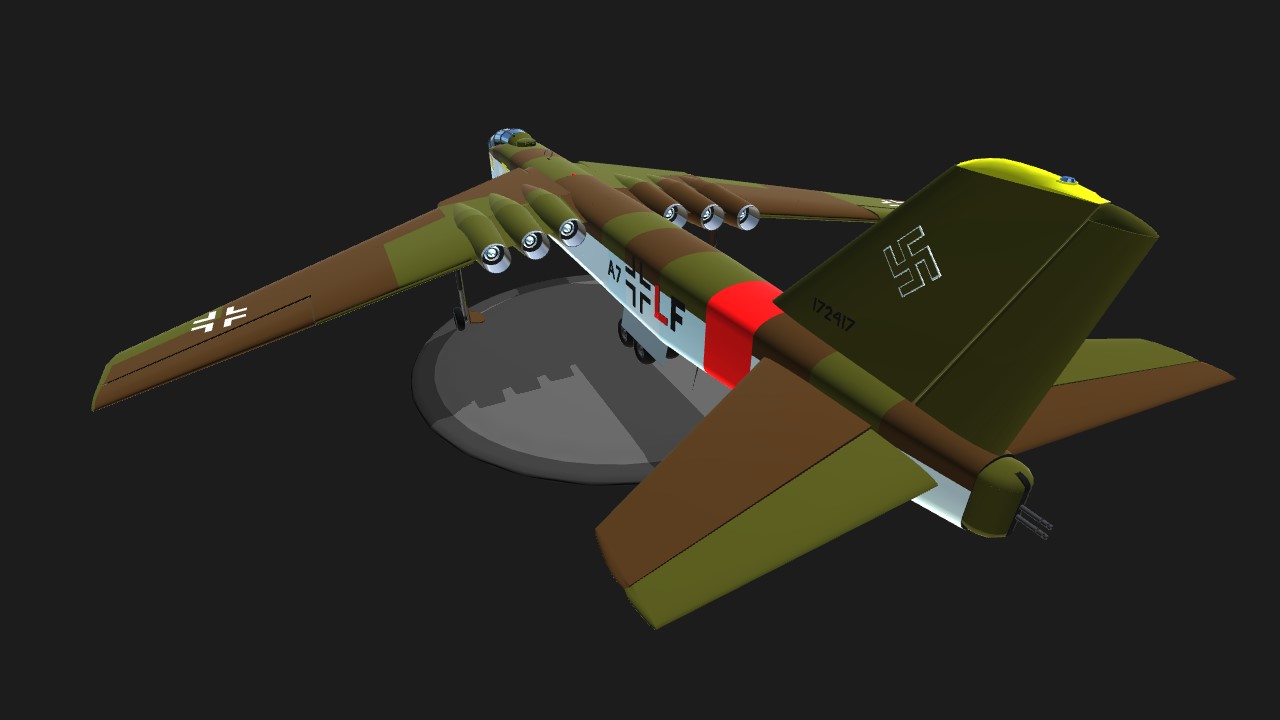
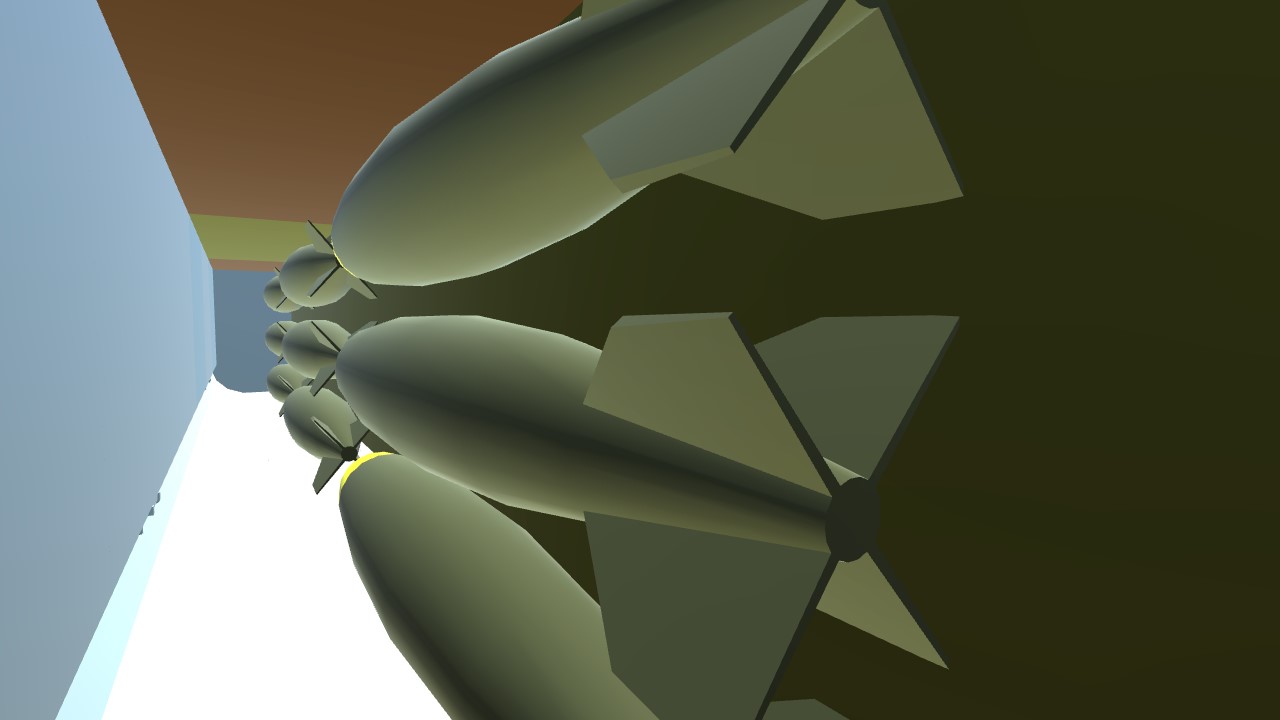
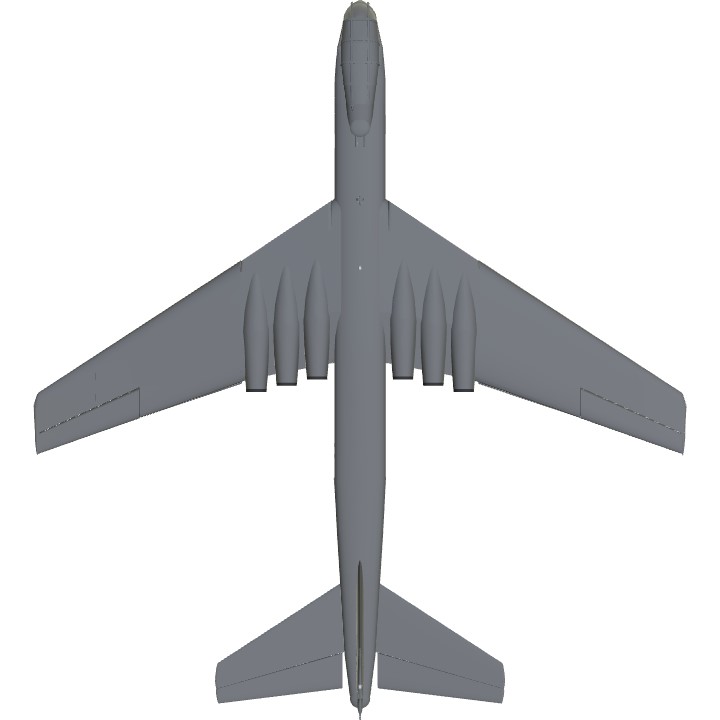
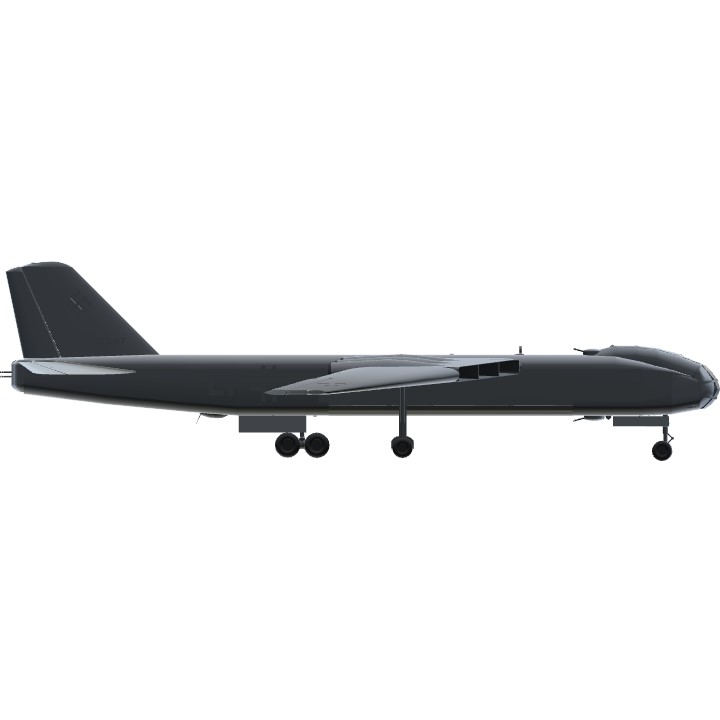
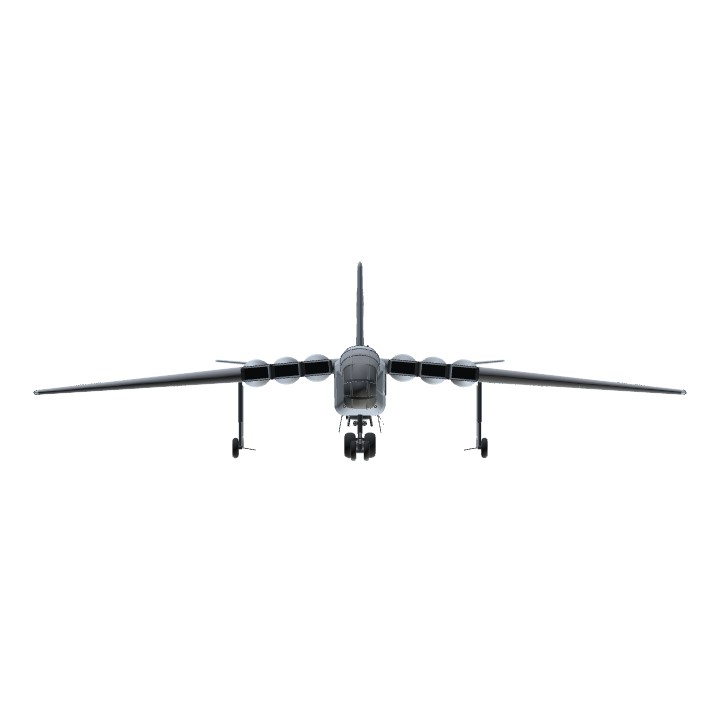
Yes waffle 🧇
@NexusGaming @50CalChicken fax, they really needed a good ol’ spankin.
@ChiChiWerx sad
@Cheems no, I was not planning on building a Ju-288.
You gonna build the 288?
Please
@NexusGaming it was
@50CalChicken exactly, as a result the Nazis getting their ä$$ kicked by Britain and the US was a good thing
@NexusGaming uh.....
@50CalChicken yes, albeit waffles made of Jew flesh
Thank you for your service!!!!!!!!!!!!!!!!!!!!!!!!!!!!!!!!!!!!!!!!!!!! @chichiwerx
Do they serve waffles on board?
This thing is way more complicated than I can fly
@Mikey101234 huh?
God no, the xenomorphs have boarded the simple planes website
@RedRoosterII, thanks! This is one of my earlier “replica” builds—it proved to be surprisingly popular. It presented challenges in that it was a design study, so good documentation was scarce, plus the learning curve was steep (I didn’t know at the time that I could make hinges that operated in only one direction; hence, the warning not to close the doors up into the bomb bay where they will cause the bombs to unintentionally detonate). I’m toying with the idea to rebuild this one with a better wing, sequenced landing gear doors, XML drag reduction for better performance and a better overall shape.
@TheSleepingInsomniac great, thanks for your kind appraisal. That bombsight was kind of a bear to get right, but I’m glad you appreciate it. As a brand new member of the community, welcome, lots of great builds available on the site and you’ll find we’re a very friendly and helpful community. If you have questions, simply tag a user by using the @ followed by the user name (no space) and you’ll find most are pretty responsive.
Wow... This is amazing. I use a "digital" bombsight mod, which is pretty accurate, and yours is almost right on it! I'd say that whatever deviation is in there would be acceptable. After all, any bombsight isn't 100% accurate. I absolutely loved flying this thing.
noice!
@ChiChiWerx Awesome! I was thinking there must be something for it :P Didnt know the trim was trim XD I find it pretty hard to read sometimes... But Awesome plane mayn! I liked it alot
@Franticmatty saw your YouTube video where you flew my plane...very entertaining. In case you were still wondering, the trim slider on the right of the screen is the trim, which works the same way trim does on real aircraft. You slide it down to pull and keep the nose up, or push it forward to push the nose down. You mentioned "I have to keep pulling the nose up", well, that's what trim is supposed to do for you so that you don't have to keep pulling back on the stick, you set the trim and the plane should fly close to level flight. You seem to be interested in aviation. If you ever do graduate from simulations into real life flying, this is one of the first things your flight instructor will teach you about.
@Franticmatty
@FranticMatty
@XYL 这可能是一个问题,但飞机从未实际建成
我很在意那些发动机的散热问题/手动滑稽